英语语法 第一章 词 短语 和句子
高中英语人教版全七册教材各单元语法整理清单

2019版人教版高中英语全教材各单元语法汇总必修一Wele Unit 简单句的基本结构一、句子成分二、基本句子结构必修一Unit 1 短语的类型和功能一、名词短语二、形容词短语三、副词短语必修一Unit 2 将来时的表达一、现在进行时的基本用法二、现在进行时表将来的用法三、其他几种表示将来的结构必修一Unit 3 反意疑问句附加疑问句一、否定附加疑问句的回答二、回答附加疑问句的原则三、附加疑问句的几种特殊情况必修一Unit 4 限制性定语从句1关系代词一、关系代词的用法二、使用定语从句的注意事项必修一Unit 5 限制性定语从句2关系副词与“介词+关系代词”一、关系副词引导的定语从句二、“介词+关系代词”引导的定语从句必修二必修二Unit 1 定语从句需注意的问题限制性定语从句一、基本概念二、关系词的种类和功能三、that和which引导定语从句的区别必修二Unit 2 现在进行时的被动语态1.现在进行时的被动语态的构成形式2.现在进行时的被动语态表示的意义3.现在进行时的被动语态注意要点必修二Unit 3 现在完成时的被动语态一、现在完成时的被动语态的常用句式二、现在完成时的被动语态的用法三、使用现在完成时的被动语态要注意6点问题必修二Unit 4 过去分词的功能一、过去分词作宾语补足语二、过去分词作定语必修二Unit 5 过去分词作状语一、过去分词作表语二、过去分词(短语)作状语必修三必修三Unit 1 动词ing形式作定语、表语一、动词ing形式作表语二、动词ing形式作定语必修三Unit 2 现在分词作宾语补足语、状语一、动词ing形式作状语二、动词ing形式作宾语补足语必修三Unit 3 省略句一、简单句中的省略二、并列句中的省略三、复合句中的省略四、其他的省略情况必修三Unit 4 动词不定式作定语、状语动词不定式一、结构二、用法必修三Unit 5 情态动词与过去将来时情态动词1.can/could的用法2.may/might的用法must/have to的用法3.shall/should的用法4.will/would的用法5.should/ought to的用法6.“情态动词+have done”的用法。
u1-t3 仁爱九年级英语重点短语、句子汇总及语法精粹
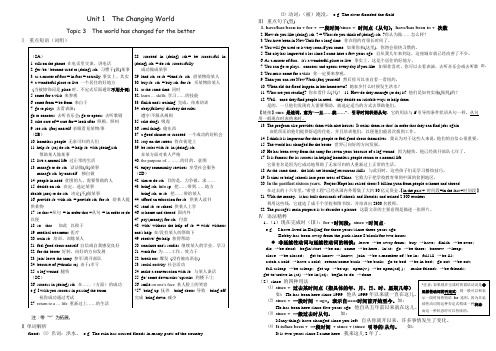
Unit 1 The Changing WorldTopic 3 The world has changed for the better Ⅰ. 重点短语(词组)注:带“*”为拓展。
Ⅱ.单词解析flood:⑴名词:洪水。
e.g. The rain has caused floods in many parts of the country.⑵动词:(被)淹没。
e.g. The river flooded the field. Ⅲ. 重点句子(型)1. have/has been in + for + 一段时间/since + 时间点(从句);have/has been to + 次数2. How do you like (doing) sth. ? = What do you think of (doing) sth. ?你认为做……怎么样?3. Y ou have been in New Y ork for a long time. 你在纽约有很长时间了。
4. Y ou will get used to it very soon if you come. 如果你来(这里),你将会很快习惯的。
5. The city has improved a lot since I came here a few years ago. 自从我几年来到这,这座城市就已经改善了不少。
6. As a matter of fact,it's a wonderful place to live. 事实上,这是个居住的好地方。
7. Y ou can go to plays,concerts and operas every day if you like. 如果你喜欢,你可以去看表演,去听音乐会或去听歌8. Y ou must come for a visit. 你一定要来参观。
9. Then you can see New Work (for) yourself. 然后你可以亲自看一看纽约。
4. 英语语法基础-名词短语的构造方法
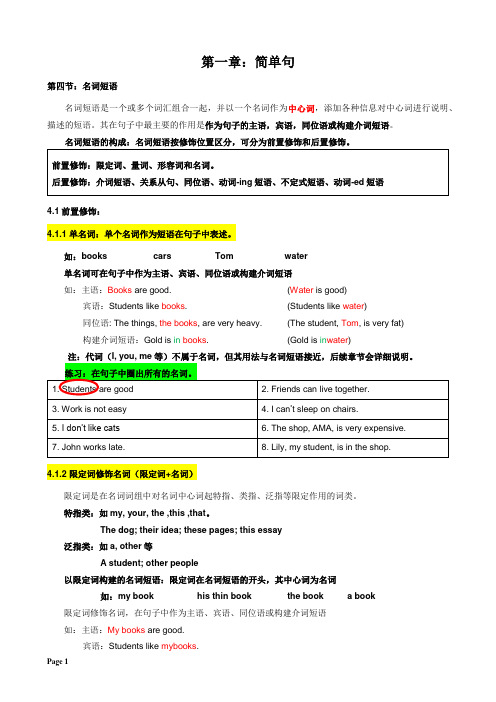
第一章:简单句第四节:名词短语名词短语是一个或多个词汇组合一起,并以一个名词作为中心词,添加各种信息对中心词进行说明、描述的短语。
其在句子中最主要的作用是作为句子的主语,宾语,同位语或构建介词短语。
名词短语的构成:名词短语按修饰位置区分,可分为前置修饰和后置修饰。
4.1前置修饰:4.1.1 单名词:单个名词作为短语在句子中表述。
如:books cars Tom water单名词可在句子中作为主语、宾语、同位语或构建介词短语如:主语:Books are good. (Water is good)宾语:Students like books. (Students like water)同位语: The things, the books, are very heavy. (The student, Tom, is very fat)构建介词短语:Gold is in books. (Gold is in water)4.1.2 限定词修饰名词(限定词+名词)限定词是在名词词组中对名词中心词起特指、类指、泛指等限定作用的词类。
特指类:如my, your, the ,this ,that。
The dog; their idea; these pages; this essay泛指类:如a, other等A student; other people以限定词构建的名词短语:限定词在名词短语的开头,其中心词为名词如:my book his thin book the book a book 限定词修饰名词,在句子中作为主语、宾语、同位语或构建介词短语如:主语:My books are good.宾语:Students like mybooks.Page 1同位语: The things, my books, are very heavy.构建介词短语:Gold is in my books.4.1.3量词修饰名词(量词+名词)量词是表示数量的一类词汇,说明名词的数量如:some, any, a lot of, plenty of, both等词汇以量词构建的名词短语:量词在名词短语的开头,其中心词为名词。
人教新目标英语八年级上册Unit1-3重点词组句子及语法
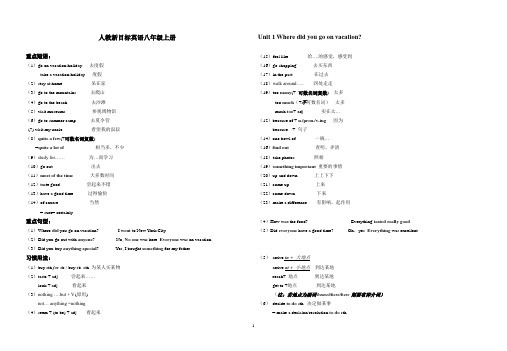
人教新目标英语八年级上册Unit 1 Where did you go on vacation?重点短语:(1)go on vacation/holiday 去度假take a vacation/holiday 度假(2)stay at home 呆在家(3)go to the mountains 去爬山(4)go to the beach去沙滩(5)visit museums 参观博物馆(6)go to summer camp 去夏令营(7) visit my uncle 看望我的叔叔(8)quite a few(+可数名词复数)=quite a lot of 相当多,不少(9)study for……为…而学习(10)go out 出去(11)most of the time 大多数时间(12)taste good 尝起来不错(13)have a good time过得愉快(14)of course 当然= sure= certainly (15)feel like 给….的感觉,感受到(16)go shopping 去买东西(17)in the past 在过去(18)walk around…..四处走走(19)too many(+ 可数名词复数) 太多too much(+不可数名词)太多much too+ adj. 实在太…(12)because of + n./pron./v-ing 因为because + 句子(14)one bowl of 一碗…(16)find out 查明,弄清(18)take photos 照相(19)something important重要的事情(20)up and down 上上下下(21)come up 上来(22)come down 下来(23)make a difference 有影响,起作用重点句型:(1)Where did you go on vacation? I went to New York City.(2)Did you go out with anyone? No, No one was here. Everyone was on vacation. (3)Did you buy anything special? Yes, I bought something for my father. (4)How was the food? Everything tasted really good. (5)Did everyone have a good time? Oh,yes. Everything was excellent.习惯用法:(1)buy sth for sb./ buy sb. sth 为某人买某物(2)taste + adj. 尝起来……look + adj 看起来(3)nothing ….but + V.(原形)not… anything =nothing(4)seem + (to be) + adj 看起来(5)arrive in + 大地点arrive at + 小地点到达某地reach+ 地点到达某地get to +地点到达某地(注:若地点为副词home/there/here则要省掉介词)(6)decide to do sth. 决定做某事= make a decision/resolution to do sth.(7) try doing sth. 尝试做某事try t o do sth. 尽力/努力/设法做某事 try one’s bes t to do sth 尽力做某事 try 过去式:tried, 三单:tries (8)enjoy doing sth . 喜欢做某事 enjoy oneself 玩得开心 (9)want to do sth . 想去做某事 (10)start / begin doing sth. 开始做某事 start / begin to do sth. 开始做某事 (11)stop doing sth. 停止正在做的某事 stop to do sth 停下来做(另一件)某事 (12)dislike doing sth. 不喜欢做某事dislike to do sth . 不喜欢做某事 (13)Why not do sth. 为什么不做…….呢? =Why don’t you do sth.(14)so + adj + that + 从句 如此…以至于 (15)tell sb. (not) to do sth.告诉某人(不要)做某事(16)keep doing sth. 一直做某事Keep on doing sth. 坚持/继续做某事 (17)forget to do sth . 忘记去做某事forget doing sth 忘记做过某事 (remember 记得, 用法一样) 语法点:1.seem 的用法(1)seem + 形容词 看起来….. You seem happy today.(2)seem + to do sth . 似乎、好像做某事 I seem to have a cold No one seemed to be bored.(3)It seems / seemed that+ 句子 看起来好像…;似乎…. It seems that no one believes you. 2. decide to do sth .决定做某事 We decided to go to the beach.. decide + 疑问词 + 动词不定式 He can not decide when to start . 3. over 介词,多于,超过,在…以上(表示数目、程度)= more than My father is over 40 years old. We waited over an hour for the train. 4. because of 因为,由于,后接名词、代词或动名词,不能接句子。
Unit1语法知识点
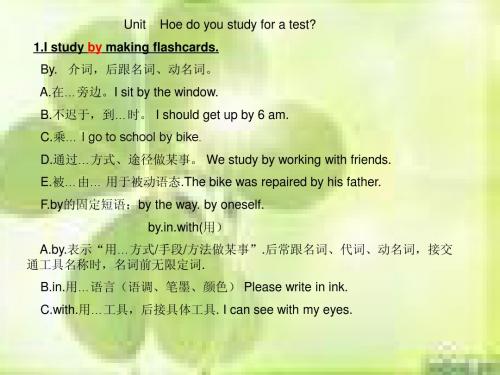
D. decide+疑问句+to do 决定.
A. either. 用于否定句句尾,前用逗号隔开.
B. too. 用于肯定句、疑问句句尾,前用逗号隔开. C. also. 用于肯定句、疑问句句中,动词前,实义动词前.
D. as well.用于口语,放在句末,不用于否定句.
20. take notes (of). 记笔记,做记录. make a note of. “满意、记住、记下” . 21. look for寻找 look after照顾 look over查看 look forward to渴望 , 向往 look at看着 lookup抬头看,在……查找 look up to尊敬 look down upon瞧不起 look like看起来像 look as if/though看起来好像 look into调查 look out当心 look out of往……外看
What do you do with your camera?
25. worry about = be worried about. be worried about一般不用于祈使句. 26. be angry with sb be angry at/about sth
27. break off.
She is too happy to go shopping .
F. too前有never、not、only、but、all等词时,表“非常”,加强语气,动 词不定式表肯定. It’s never too late to learn. 5. sound.声音.自然界中各种声音,无感情色彩. the sound of breaking glass. voice.噪音、说话声、鸟叫声(可数). in a low voice 低up a story / a conversation make up of.“构成”(多用于被动语态) 23. unless=if…not 如果unless引导的分句本身就是否定句,不能用if…not代替. You will get good grades unless you do your homework. 24. deal with处理,应付.=do with. deal with,常与how连用,侧重于解决问题,强调处理问题的方法. do with,常与what连用,侧重于对某事物的利用. He has learnt to deal with difficulties.
新高中英语语法归纳总结归纳
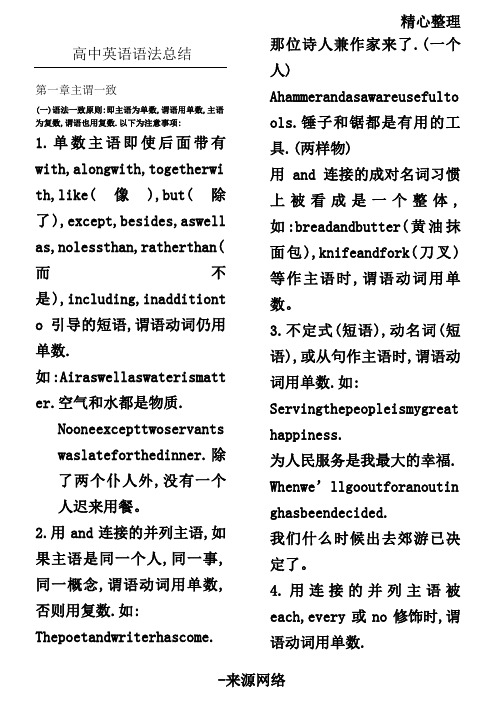
精心整理高中英语语法总结第一章主谓一致(一)语法一致原则:即主语为单数,谓语用单数,主语为复数,谓语也用复数.以下为注意事项:1.单数主语即使后面带有with,alongwith,togetherwi 了而是o 如er.2.用and 连接的并列主语,如果主语是同一个人,同一事,同一概念,谓语动词用单数,否则用复数.如:Thepoetandwriterhascome.那位诗人兼作家来了.(一个人)Ahammerandasawareusefulto ols.锤子和锯都是有用的工具.(两样物)用and 连接的成对名词习惯体,油抹刀叉)(短. 我们什么时候出去郊游已决定了。
4.用连接的并列主语被each,every 或no 修饰时,谓语动词用单数.Everyboyandeverygirllikes togoswimming.每个男孩和每个女孩都喜欢去游泳. Noteacherandnostudentwasa bsentfromthemeeting.没有老师也没有学生开会缺席.语如6.或单仍用复数.如: Manyaboylikesplayingbaske tball.许多男生都喜欢打篮球. Morethanonestudentwaslate.不只一个学生迟到Morepersonsthanonecometoh elpus.不止一个人来帮助我们。
7.none做主语时,谓语动词可用单数,也可用复数;但在代.人这事词.如:这些谓语一般用单数.如: Apairofglassesisonthedesk.桌上有一副眼镜。
9.形复意单名词如:news;以ics结尾的学科名称如:physics,mathematics,ec onomics;国名如:theUnitedStates;报纸名如:theNewTimes;书名如:ArabianNight<天方夜谈>;以及TheUnitedNations<联合国>10.““如(二)内容一致原则:1.主语中有all,half,most,therest等,以及”分数或百分数+名词”做主语时,谓语动词单复数取决于连用的名词.如: Therestofthebikesareonsal etoday.剩下的自行车,今天出售。
精选英语高一必修一语法词汇句型大总结
精选英语高一必修一语法词汇句型大总结Unit1 Friendship【重点词汇、短语】1. add up 合计2. upset vt&vi 弄翻,使…不安,使心烦,扰乱adj. 心烦意乱的,不舒服的,不适的,难过的.3. ignore不理睬、忽视4. calm (使)平静、(使)镇定calm down 平静/镇定下来5. have got to 不得不、必须6. concern (使)担忧、涉及、关系到be concerned about…关心,挂念7. go through 经历、经受8. set down 记下、放下、登记9. a series of 一系列10. on purpose 故意11. in order to 为了……12. at dusk 在黄昏时刻13. face to face 面对面地14. no longer/not…any longer 不再……15. settle 安家、定居、停留16. suffer 遭受、忍受、经历17. suffer from 遭受、患病18. recover 痊愈、恢复、重新获得19. get/be tired of 对……厌烦20. pack 捆扎,包装/包裹21. pack (sth) up 将(东西)装箱打包22. get along with 与……相处23. fall in love 爱上24. disagree 不同意25. join in 参加【重点句型】1. It was the first time in a year and a half that I had seen the night face to face. (从句时态用完成时)这是我一年半以来第一次目睹夜晚。
2. I wonder if it’s because I haven’t been able to be outdoors for so long that I’ve grown so crazy about everything to do with nature.(强调句)我不知道这是不是因为我长久无法出门的缘故,我变得对一切与大自然有关的事物都无比狂热。
第一章名词 英语语法
Unit 1 Nouns一.名词的分类◆注意:1. 有少数名词属兼类名词,作不可数名词表示抽象概念或物质,作C.n.时表示具体事物。
beauty美--- a beauty 美人will 意志--- a will 遗嘱room --- a room exercise锻炼--- an exercise练习word消息--- a word character性格--- a character人物iron--- an iron 电熨斗success--- an success wonder惊奇---a wonder 奇观duck---a duck2. 有些名词有单数和复数形式,但意思不同。
brain---brains 智能custom---customs good---goods difficulty---difficulties game --- games运动会green --- greens manner方式--- manners礼貌work --- works people --- peoples time --- times时代,次数wood--- woods树林damage---damages 赔偿费import--- imports进口货物necessity--- necessities必需品3. 有些抽象名词可在前面加a或an,转化为个体名词。
如:a business 一家公司 a pity 令人惋惜的事 a pleasure一件乐事 a knowledge 一门知识 a voice 一种声音 a walk 一次步行a rest 一次休息 a help 一个帮手 a surprise 一次惊奇 a failure 一次失败 a smile 微笑an interest兴趣an honor荣誉二.名词的数⑴名词复数规则变化◆注意:1. 合成词的第一个词是n.或者主体词是时,一般把第一个名词变成复数。
人教版七年级英语上册重点单词短语语法
人教版七年级英语上册重点单词短语语法Starter unit 11. 短语归纳:good morning 早上好good afternoon 下午好good evening 晚上好name list 名单an English name 英文名字2. 必背典句:(1)Good morning! 早上好!(2)Good afternoon! 下午好!(3)Good evening 晚上好!3.英语中常见的问候语(1) Hello!“你好!”是比较随便、不分时间的一种问候语,通常用于打招呼、打电话。
表示惊讶或引起对方注意。
对方应答仍用Hello!(2) Hi!“你好!”的使用比hello!更随便,在年轻人中使用更为普遍。
(3) Nice to meet you!“很高兴见到你!”是两个初次见面、经介绍相识的人互相打招呼的用于。
回答时可以说Nice to meet you, too.或者Me, too.表示“见到你很高兴”(4) How do you do?“你好!”用于初次见面,是非正式的打招呼用语。
对方应答语应是“Howdo you do?”(5)How are you? 表示问候How are you? 意为“你好吗?”,为询问对方身体状况的问候语,应答语一般是“I’m fine.Thank you. / I’m very well. Thank you. / I’m OK.How are you? 的其他用法:习惯上回答完别人的问候后,常可反问对方的身体状况,此时可用How are you?也可用And you? “你呢?”4.大写字母的用法:(1) 在英语中,句子的第一个单词的第一个字母都应大写。
Sit down, please. 请坐。
(2)字母I作人称代词时,意为“我”,在句中任何位置都必须大写。
日常用语“OK”在句中任何位置都大写。
I’m a student. 我是一名学生。
Is everything OK? 一切都好吗?(3)人名、地名、国名、某国人或某种语言等专有名词的第一个字母都必须大写。
必修一 Unit 1 Grammar-句子成分及基本句子结构
➢ e.g.
I will watch the movie.
He borrowed my key.
Time flies.
He can play basketball.
She quickly filled in the form.
句子成分
Unit 1 A new start Using language
句子成分
Unit 1 A new start Using language
表语或主语补足语 Subject complement
➢ 表语或主语补足语是接在联系动词(linking verb)之后的,用于补充说明主语所 处的状态的成分,一般由名词或形容词充当,整个句子构成所谓的“主系表”结构。 联系动词除了可以用be动词(am, is, are)构成之外,还可以用感官动词(smell, feel, taste…)充当。
c
4. I breathed deeply.
f
5. I looked at them in panic. g
6. I was embarrassed
a
7. His words made me a lot more relaxed! b
a He was friendly. b The exam made me quite nervous. c I passed him a book. d She agreed. e He wrote a long letter. f He talked loudly. g She looked after her sister patiently.
小试牛刀
造句练习
Unit 1 A new start Using language
- 1、下载文档前请自行甄别文档内容的完整性,平台不提供额外的编辑、内容补充、找答案等附加服务。
- 2、"仅部分预览"的文档,不可在线预览部分如存在完整性等问题,可反馈申请退款(可完整预览的文档不适用该条件!)。
- 3、如文档侵犯您的权益,请联系客服反馈,我们会尽快为您处理(人工客服工作时间:9:00-18:30)。
WORD
3 STRUCTURES
in PHRASE ENGLISH GRAMMAR
CLAUSE
SENTENCE
Noun, pronoun , determiner, adjective ,verb ,adverb, preposition ,conjunction , structure word , interjection ,numeral Noun phrase, ponominal phrase, verb phrase (finite .../nonfinite), adjective phrase , adverb phrase , prepositional phrase, numeral prase
Simple compound complex compound-complex Declarative interrogative imperative exclamative
Subject/prdicative/predicative/object/appositive/comple ment/attributive /adverbial clause
请判断下列结构的性质:
WORD:
John,teacher,class,kindness, the United Nations
I, you, this, herself, somebody, each other
a, the, my, this, first, Mary’s, following
old, new, red, clean, kind-hearted, fond of
do, have, can, see, tell, whitewash, look for
very, quickly, just, now, often, upstairs
at, for, in, out of, because of, in front of
and, but, if, than, because, so that, in case
oh, ah, alas, eh, dear, what, why
PHRASE:
We waited for hours and hours.
This is a very interesting story. Between you and me, he is rather stupid. Waves rushed upon him one after another. We study English every day.
He has accomplished his task.
He got up early to catch the train.
She went to the hospital to see her friend. It’s no use crying over spilt milk.
Not knowing what to say, he kept silent. I have received your letter dated May 5.
Written in simple English, the book is easy to read. They came back merry and gay.
He lay on the ground, unable to move.
How often do the buses run?
He is a scoundrel through and through.
We are of a mind.(我们大家一条心。
)
What is there on the desk?
Two and two is four.
He has two hundred and fifty dollars.
CLAUSE:
What he said is true.
It so happened that they were away. That’s how matters stand.
The fact is that I was not there.
Do you know who he is?
We are sure that our team will win.
I had an idea that you were there. There is no doubt that he is honest. Call me what you want.
Her mother has made her what she is
One who works hard deserves to succeed. There are times when such things are possible. Strike while the iron is hot.
If she comes, we’ll tell her.
He said that he would come.
This is the man who wanted to see you.
We are glad that you have succeeded.
SENTENCE:
Do you study English or French?
Tom and Mary often help each other and learn from each other.
Being directly connected with thought, language registers and fixes in words, and in words combined into sentences, the results of thought and man’s success in his request for knowledge, and thus makes possible the exchange of ideas in human society.
He is a teacher and his wife is a doctor.
You are a engineer, aren’t you?
Make up your mind, or you’ll miss the chance.
This is where she was born.
The book yuou want is very expensive.
He is not happy, though he is rich.
He said he would come; but he didn’t, because his mother was ill.
He is a doctor and his wife is a nurse who works in the same hospital.
We sat down in the window seat; I assured her I would not scold whatever her secret would be. They work very hard.
You mustn’t tell him that.
Do you speak English?
Who broke the window?
Please be quiet.
Don’t be so stupid!
What a strange thing to say!
How pleased they were to see us!。
